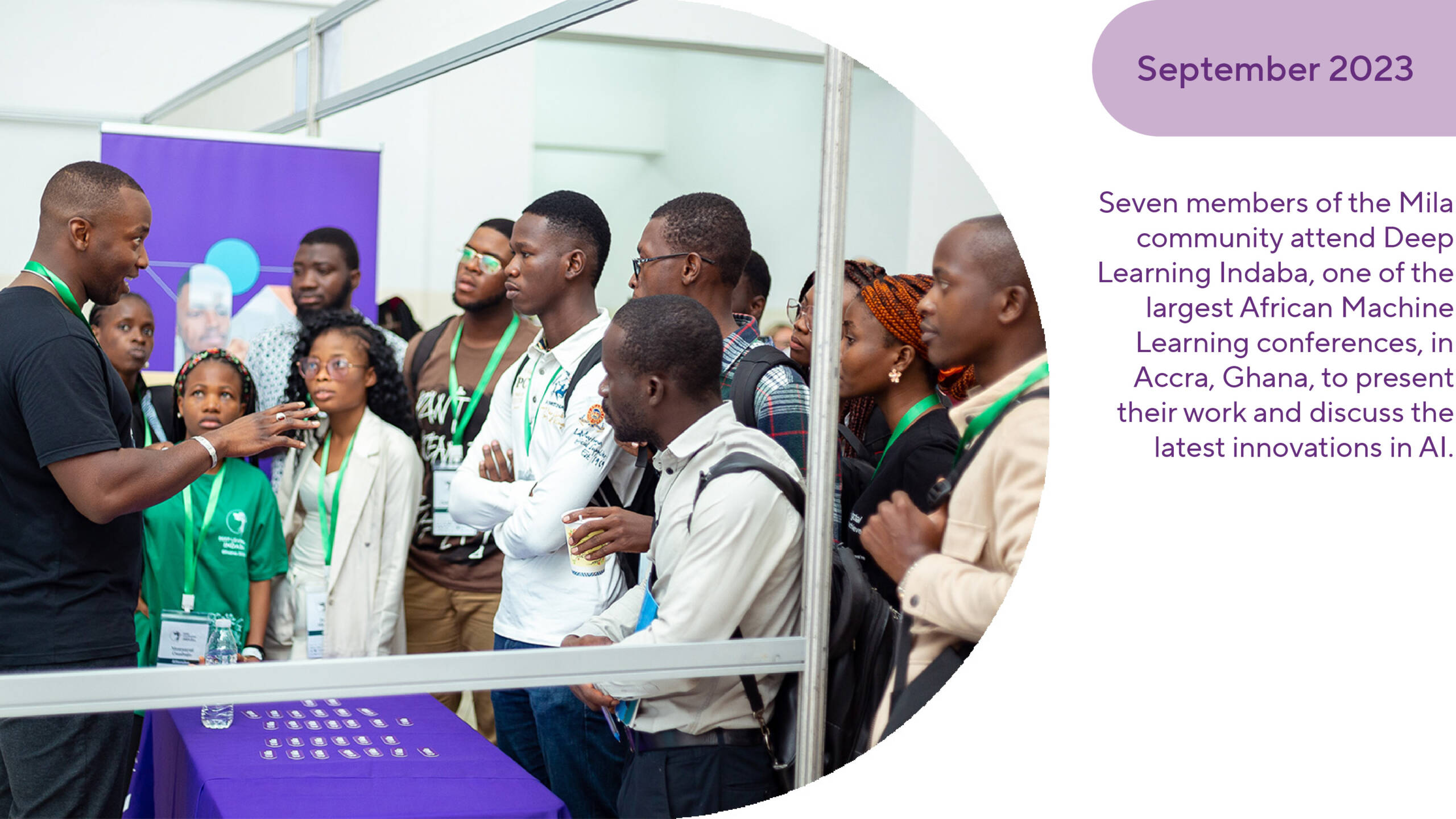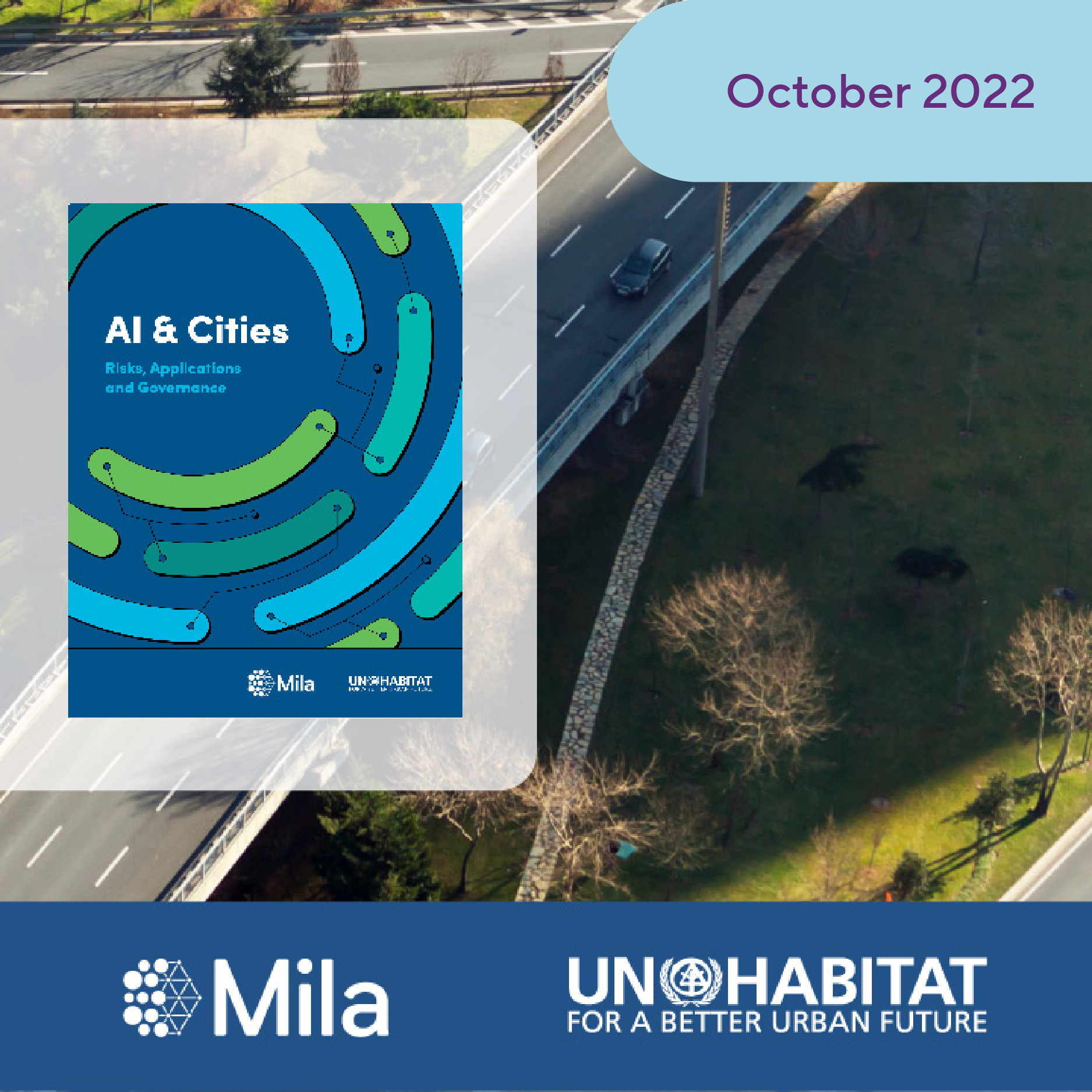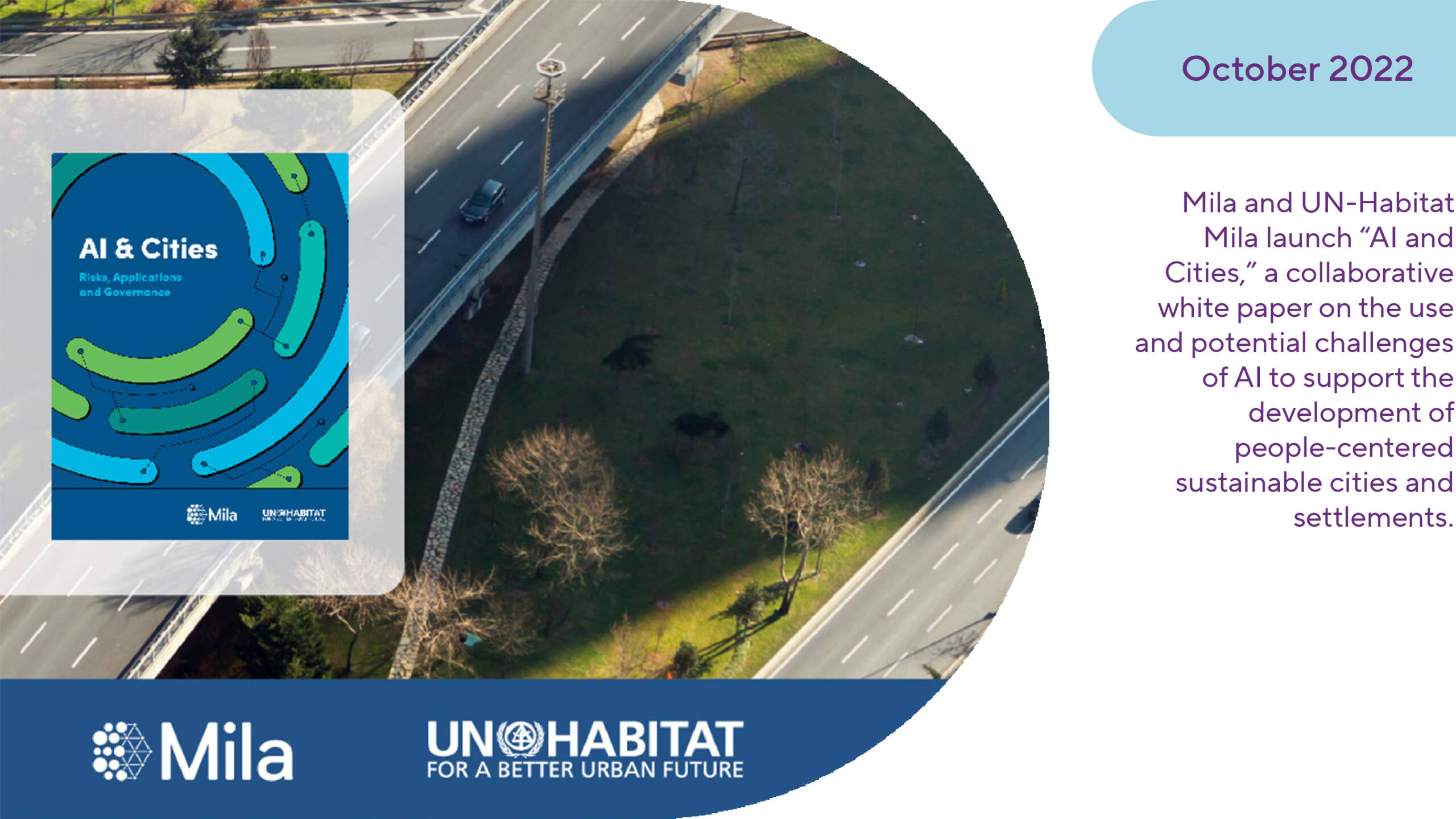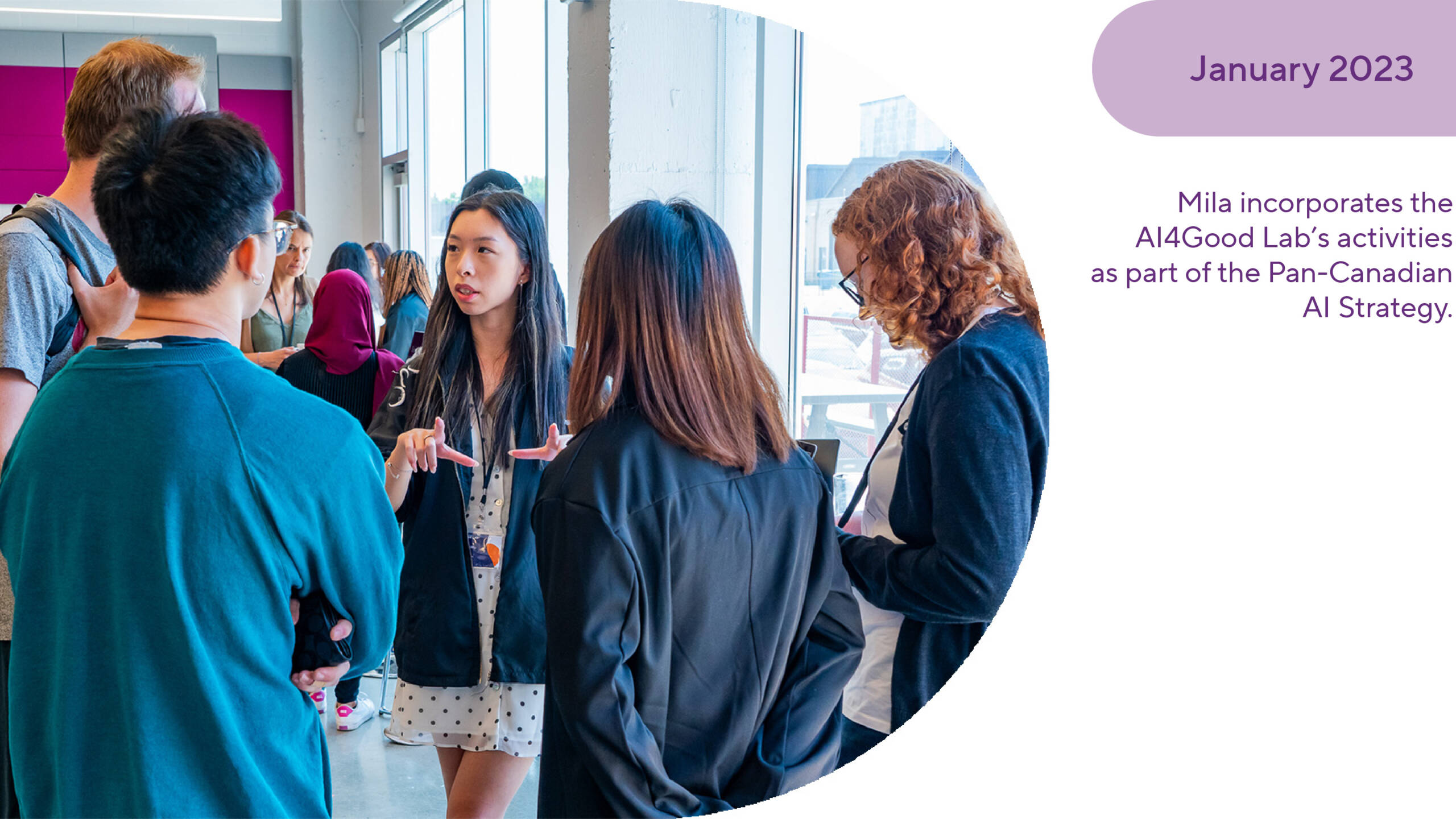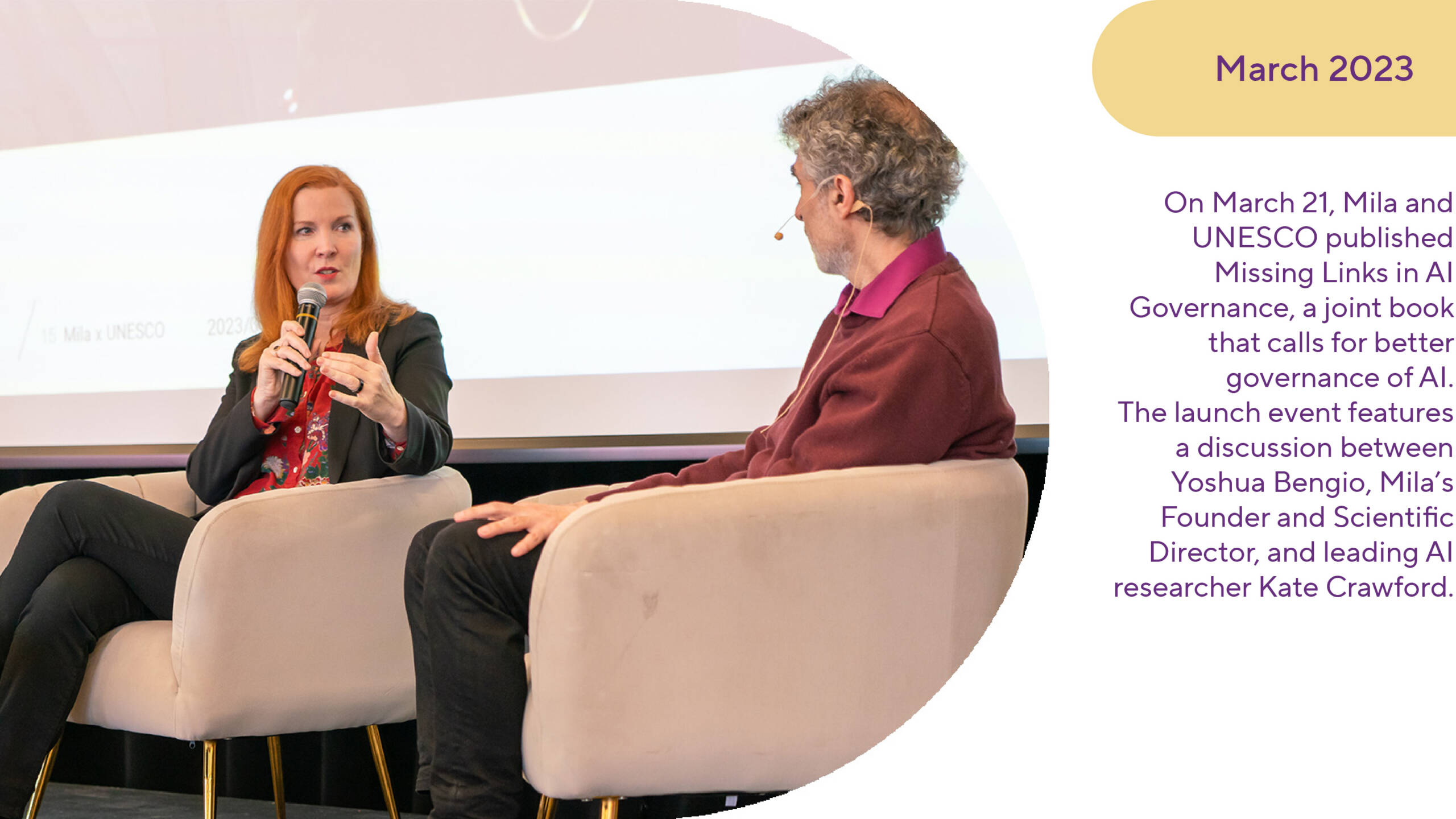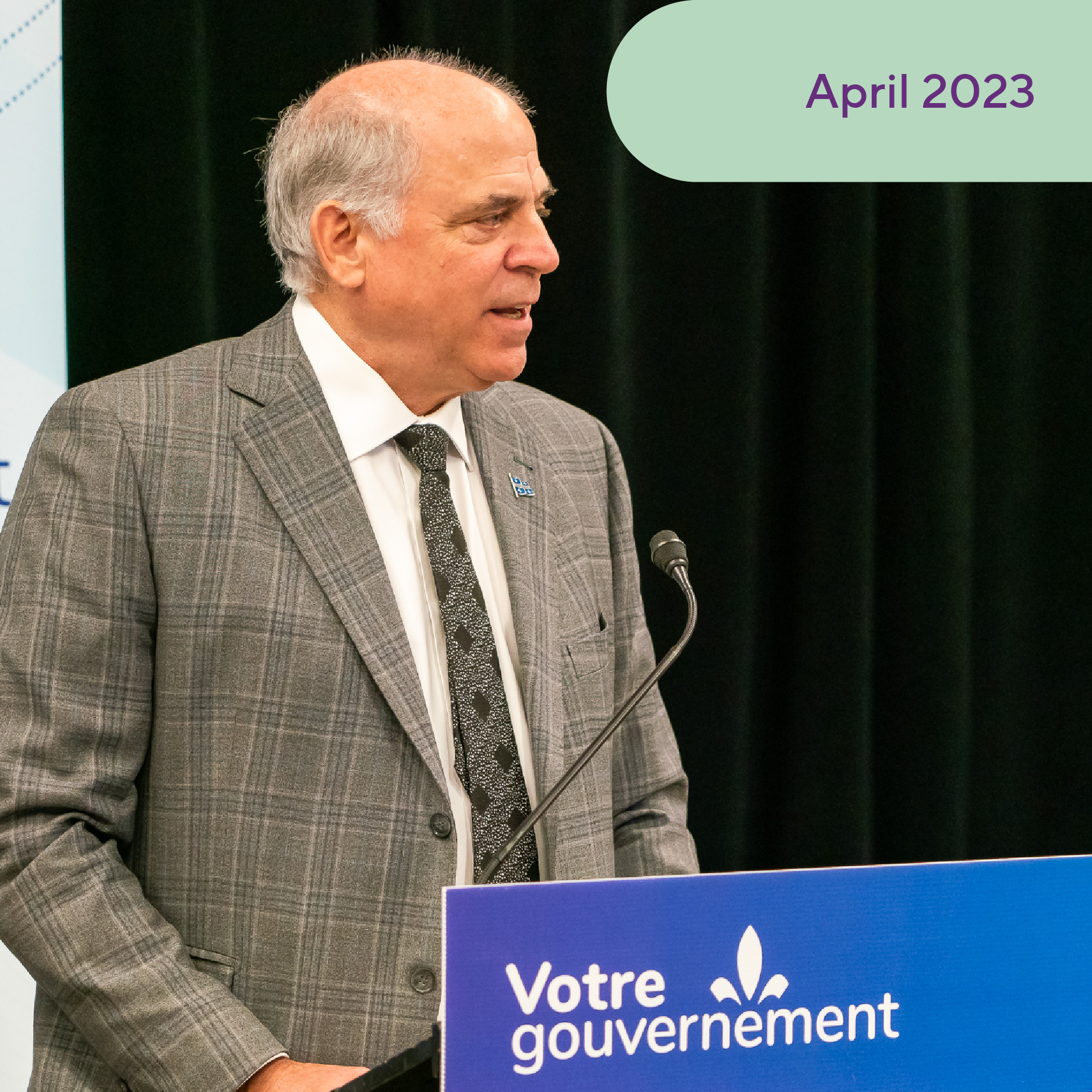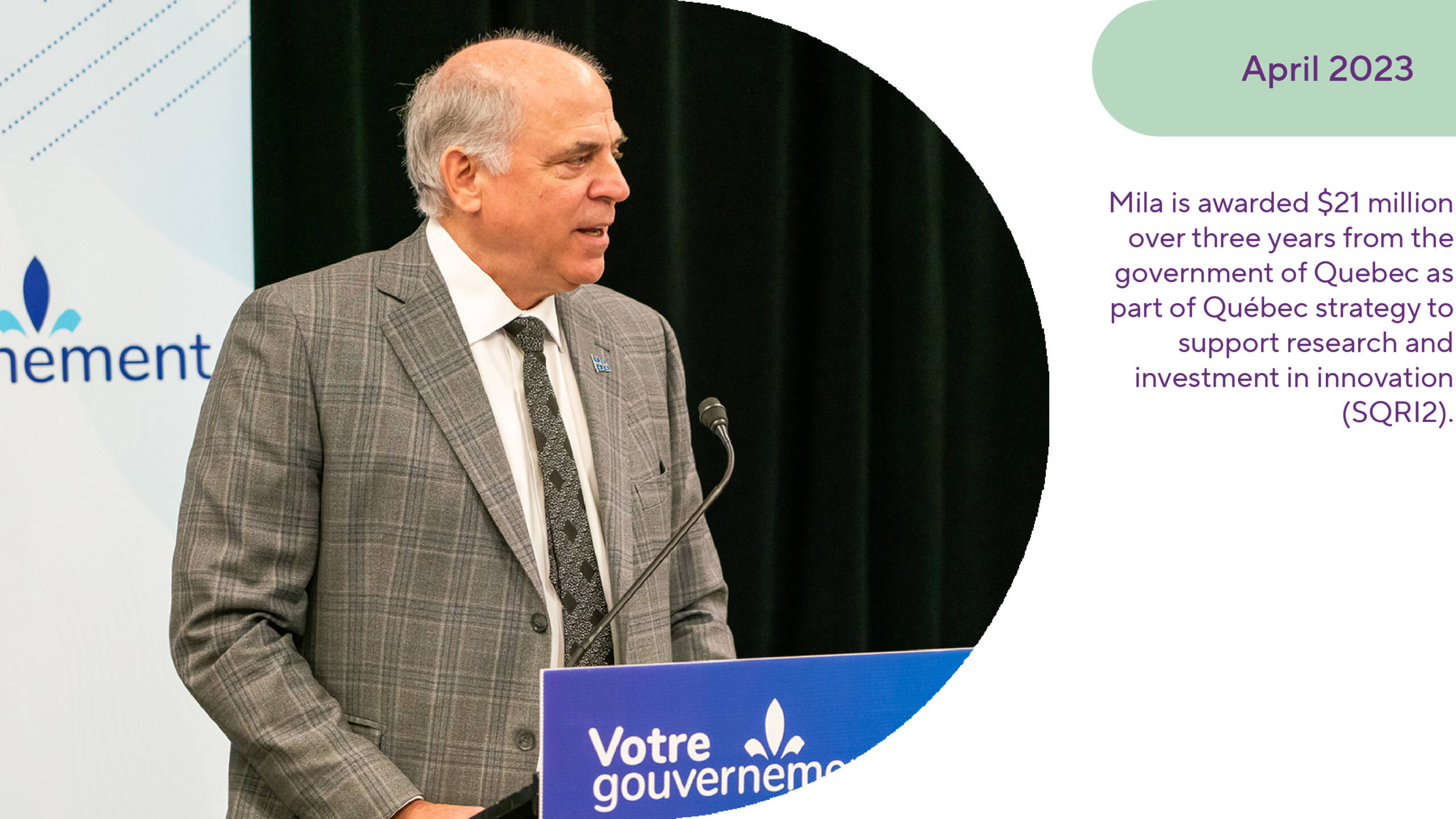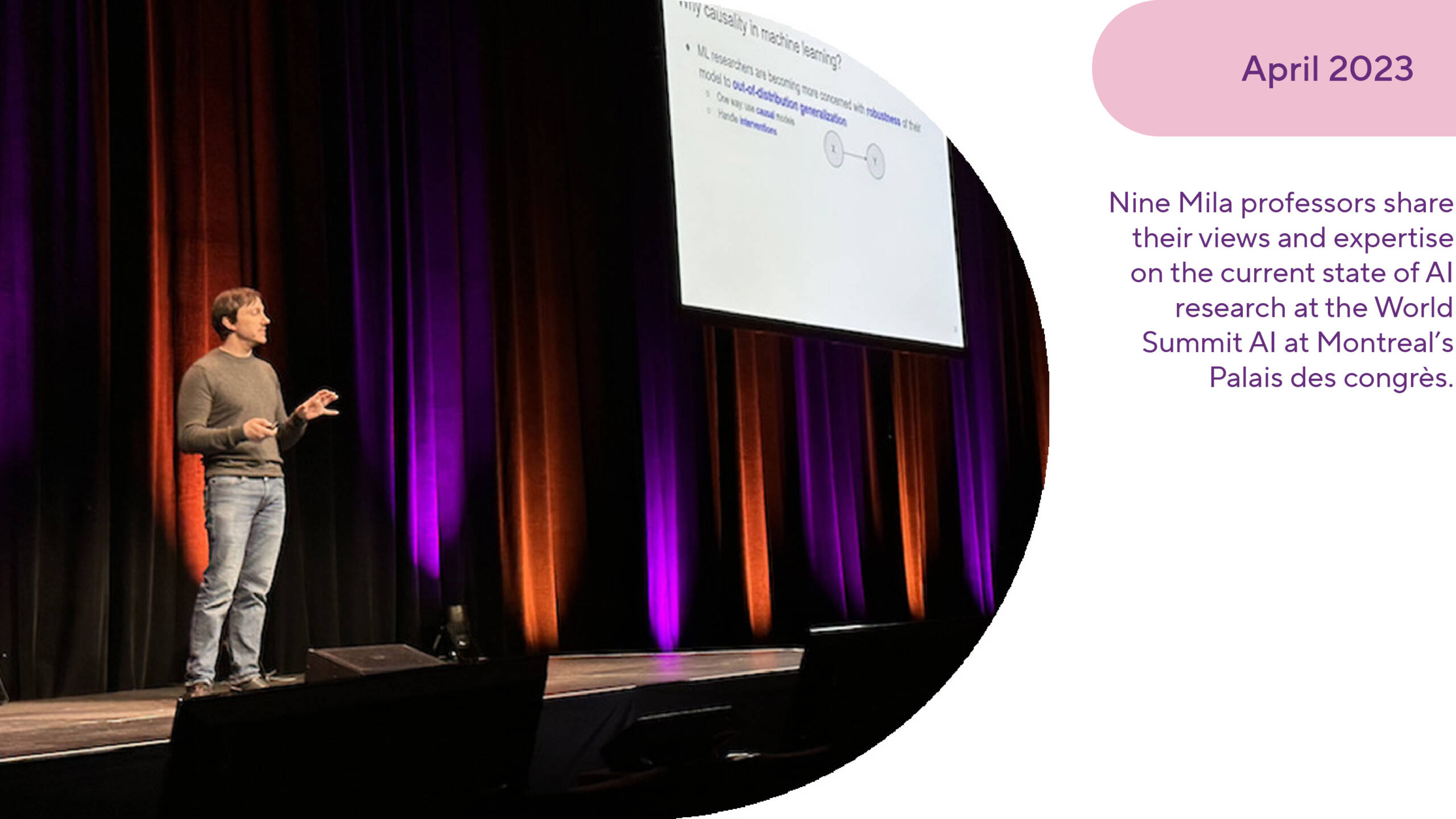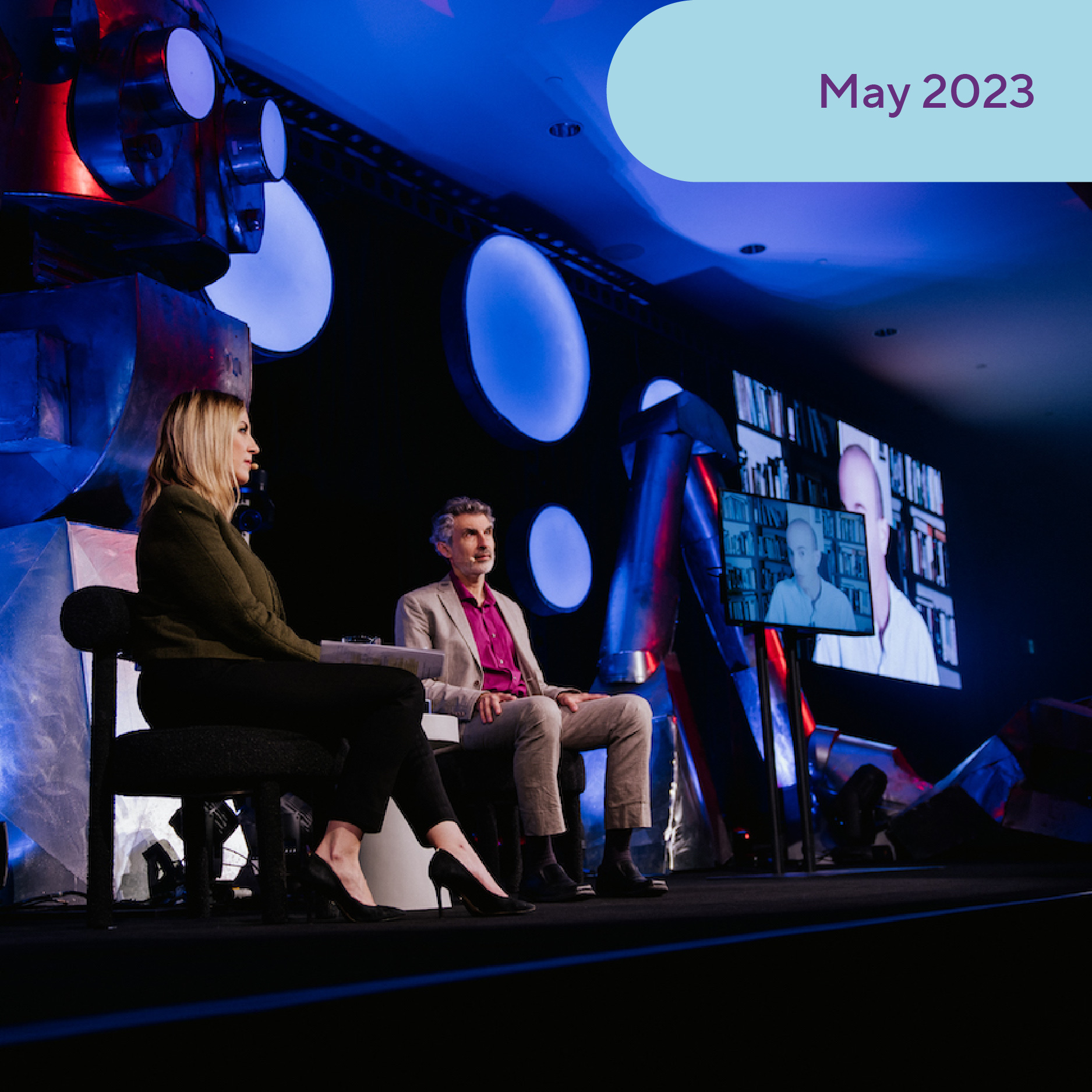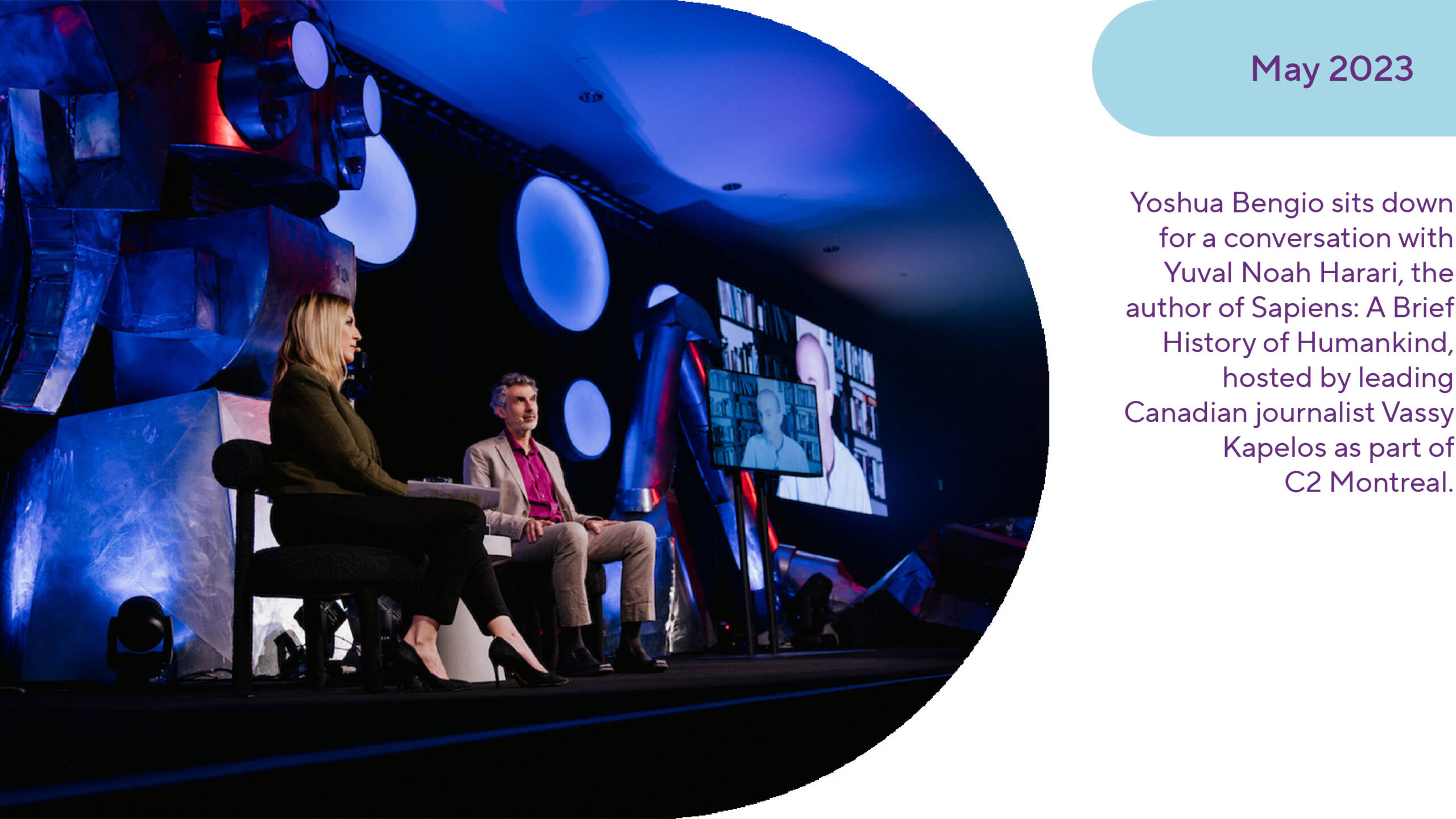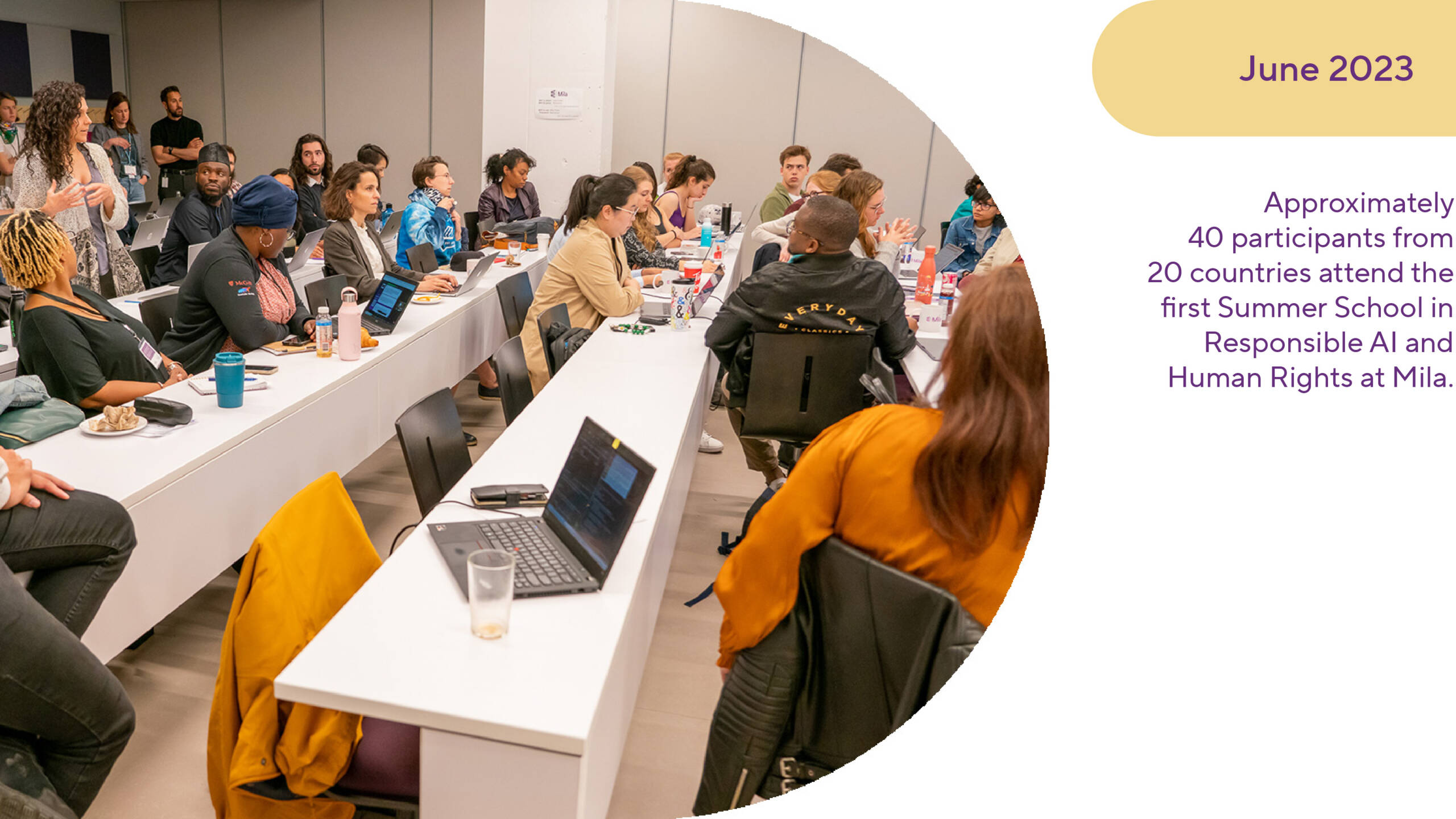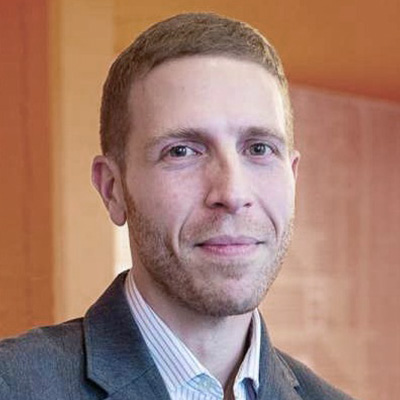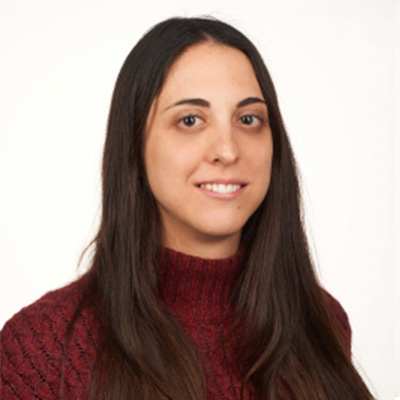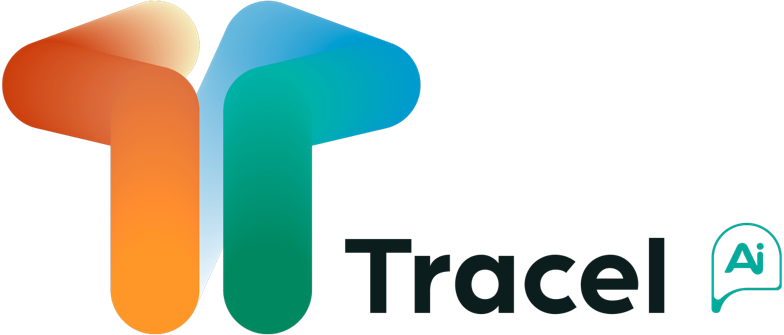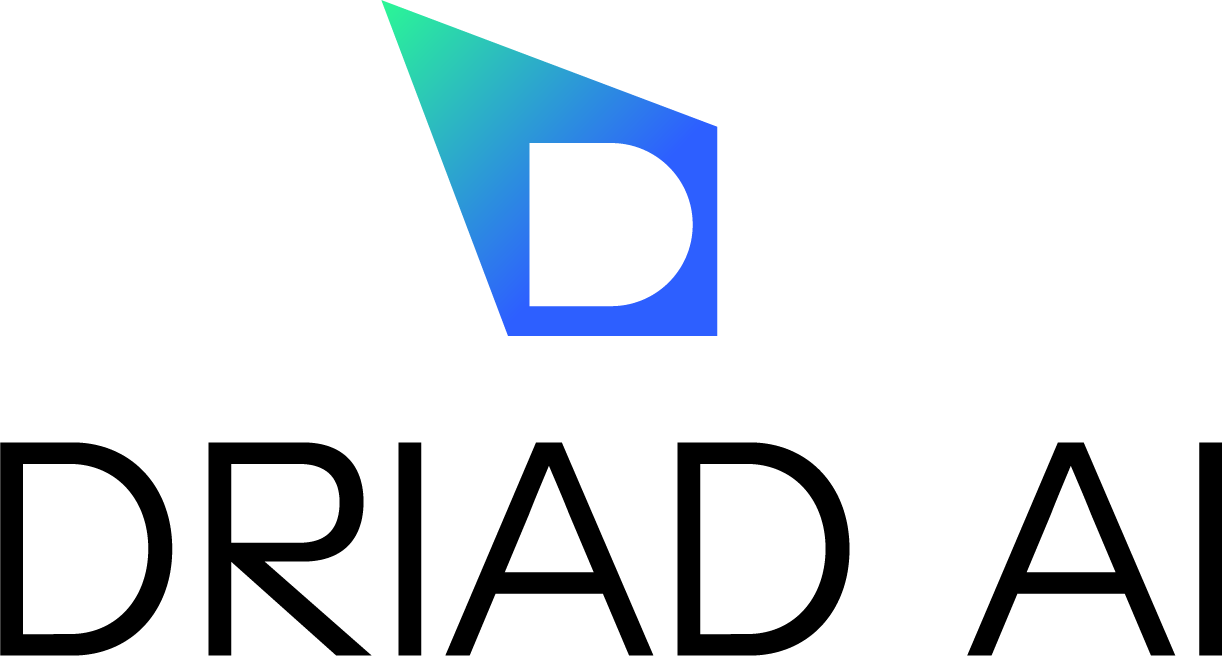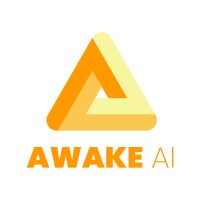Impact Report 2022-23
Impact
Report
2022-2023
Rapid evolution, shifting context, mobilized community.
Opening remarks
The past year will certainly be remembered as a pivotal one for the artificial intelligence (AI) sector. While this science has been developing at a steady pace for the last few decades, it has reached a major public milestone with the arrival of large language models: the immense potential of AI to transform our lives and industries is now there for everyone to see. This public realization is raising many questions and debates about the potential impacts of AI, both positive and negative, even within the scientific community.
The Mila community came together in 2017 on the basis of a common ambition, shared by all its members: to become a global pole for scientific advances that inspires innovation and the progress of AI for the benefit of all. The capacities and performance of AI systems are accelerating, and our community has grown from a few dozen individuals to over 1400 members, making our mission and values more important than ever. We express them in several ways, including:
- By continuing to conduct cutting-edge research that contributes to the responsible development of AI, particularly in critical sectors such as healthcare and climate change;
- By providing the next generation of AI researchers with optimal technical training, while also exposing them to the challenges of AI development and the importance of interdisciplinarity;
- By helping companies in Quebec and around the world understand how AI can be implemented effectively and responsibly to increase productivity and become a competitive advantage;
- By actively participating in the social debate surrounding the development of AI, to ensure we mitigate the risks and seize the opportunities.
Mila is proud to share some of the major research and initiatives led by members of its community over the past year. They are indicative of the cutting-edge research and important social debates taking place at our Institute.
Pierre Boivin, Chairman of the Board of Directors
Valérie Pisano, President and CEO
Yoshua Bengio, Founder and Scientific Director

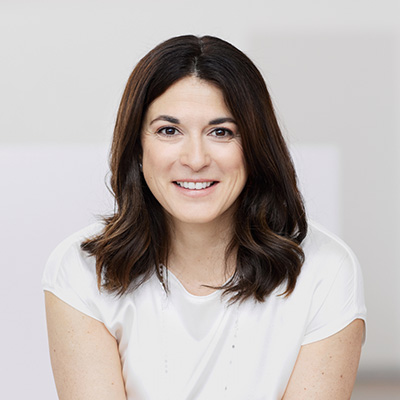
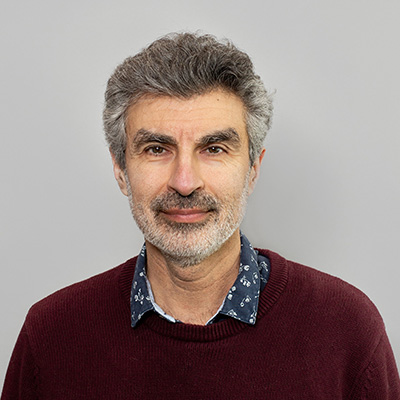
Scientific leadership
+1400Community members
This year, the Mila community has over 1400 members, including professors, researchers (at the master’s, doctorate, and postdoctorate levels, as well as trainees and visiting researchers), students (in professional master’s and graduate diploma programs) and employees. This represents an increase of 40% over the previous year.
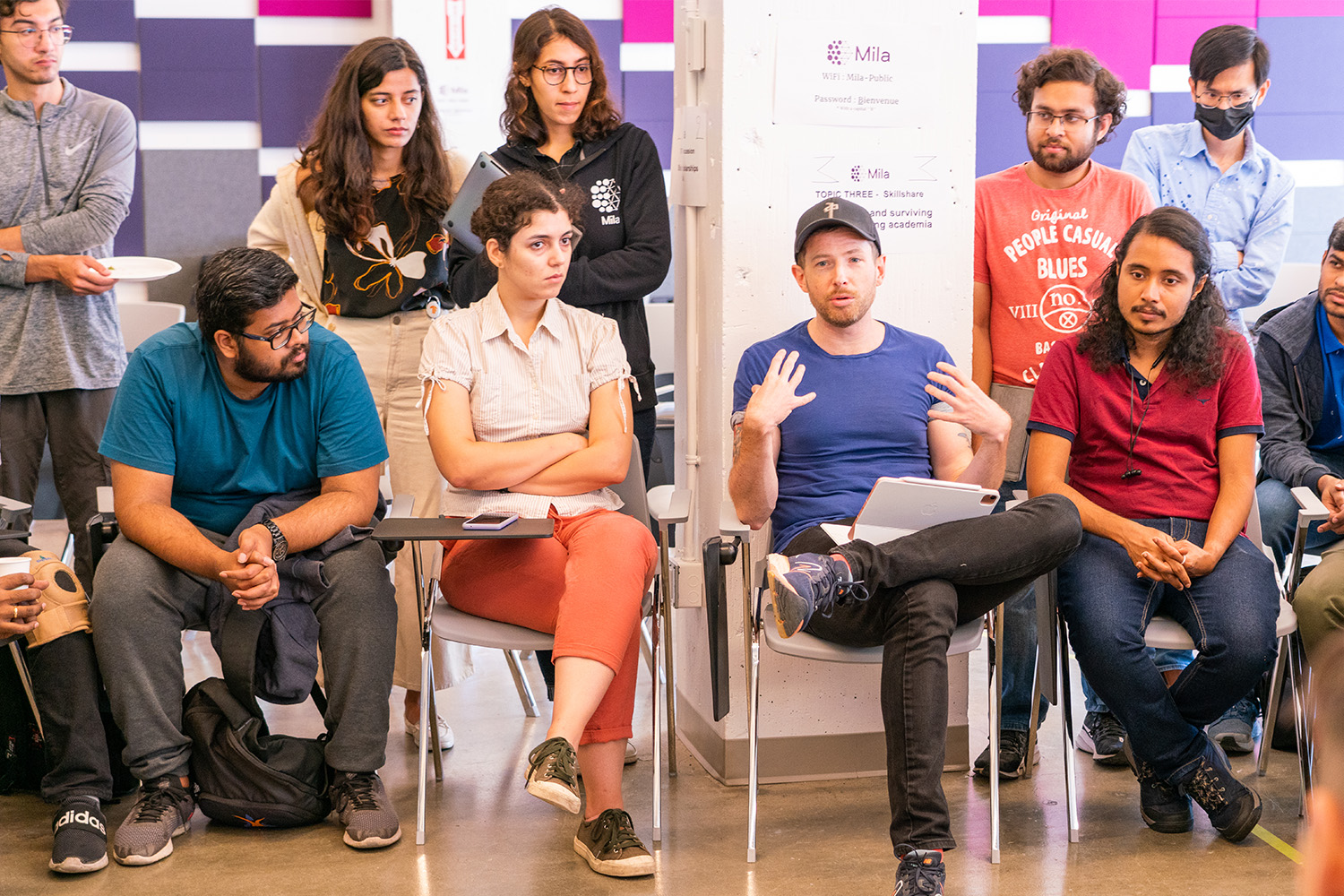
Scholarships
The number of Mila researchers who received grants and scholarships since 2022, for a 28% increase over the previous year.
Research projects
Research projects involving Mila-affiliated faculty members jumped from 447 to 604: a 35% increase.
Students
The number of students at Mila went up by 30% over the past year, thanks in large part to an increase in research funding.
Three new Canada CIFAR AI Chairs
Mila is proud to have added three new Canada CIFAR AI Chairs since April 2023, bringing the number of active chairs at Mila up to 53.
Awards and distinctions
Over the past year, our professors have garnered prestigious awards and nominations for the excellence of their work.
In October 2022, Mila Core Academic Member Blake Richards received an Arthur B. McDonald Fellowship in recognition of outstanding contributions to the fields of neuroscience and AI.
In June 2023, Mila Associate Academic Members Mathieu Blanchette and Kaleem Siddiqi were awarded a joint chair in AI in health by Fonds de recherche du Québec – Santé.
In August and September 2023, Mila Founder and Scientific Director Yoshua Bengio was named a member of the UN’s Scientific Advisory Board for Independent Advice on Breakthroughs in Science and Technology and an External Advisory Board Member of the UK’s Frontier AI Taskforce. As part of his roles, he helps both entities better understand the risks and opportunities associated with the rapid development of AI.
In September 2023, Mila Core Academic Member Joelle Pineau was named a member of the Royal Society of Canada in recognition of her significant research contribution to machine learning, particularly Bayesian inference and planning in the face of uncertainty.
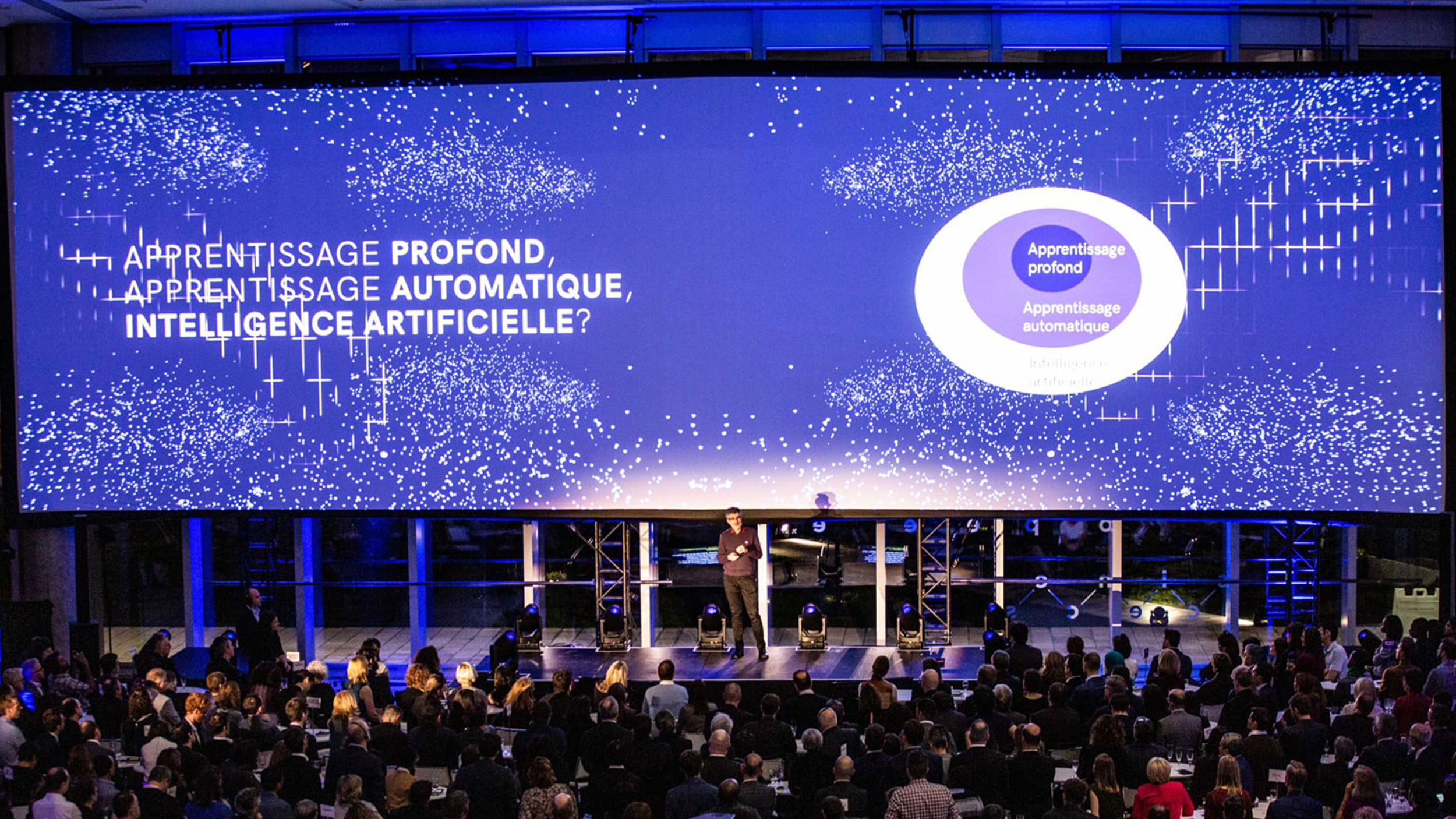
High-impact research
Robust, reasoning and responsible Al (R3AI)
Mila is a major partner in the seven-year, $125 million Canada First Research Excellence Fund grant awarded to IVADO to develop AI that is robust, reasoning and responsible (R3AI). This work will span across four application sectors: discovery of new molecules, remediation for environmental emergencies, development of “learning health systems,” and supply chain management in the context of uncertainty. The R3AI research team includes Yoshua Bengio, Doina Precup, Irina Rish, Christopher Pal and Foutse Khomh.
Abundant Intelligences: Expanding Artificial Intelligence through Indigenous Knowledge Systems
Yoshua Bengio, Blake Richards, Aaron Courville, Karim Jerbi, Guillaume Dumas and Eilif Muller are researchers on an international project to better incorporate Indigenous knowledge in AI research and development. This project, supported by the New Frontiers in Research Fund, has received funding of over $20 million over six years.
Al and robotics
Professor and Mila Associate Academic Member AJung Moon is on the executive committee of the Canadian Robotics Council. She also chairs its research and training committee, created in 2022 to help build a future where Canadians leverage robotics to enhance their productivity, safety, global competitiveness and quality of work.
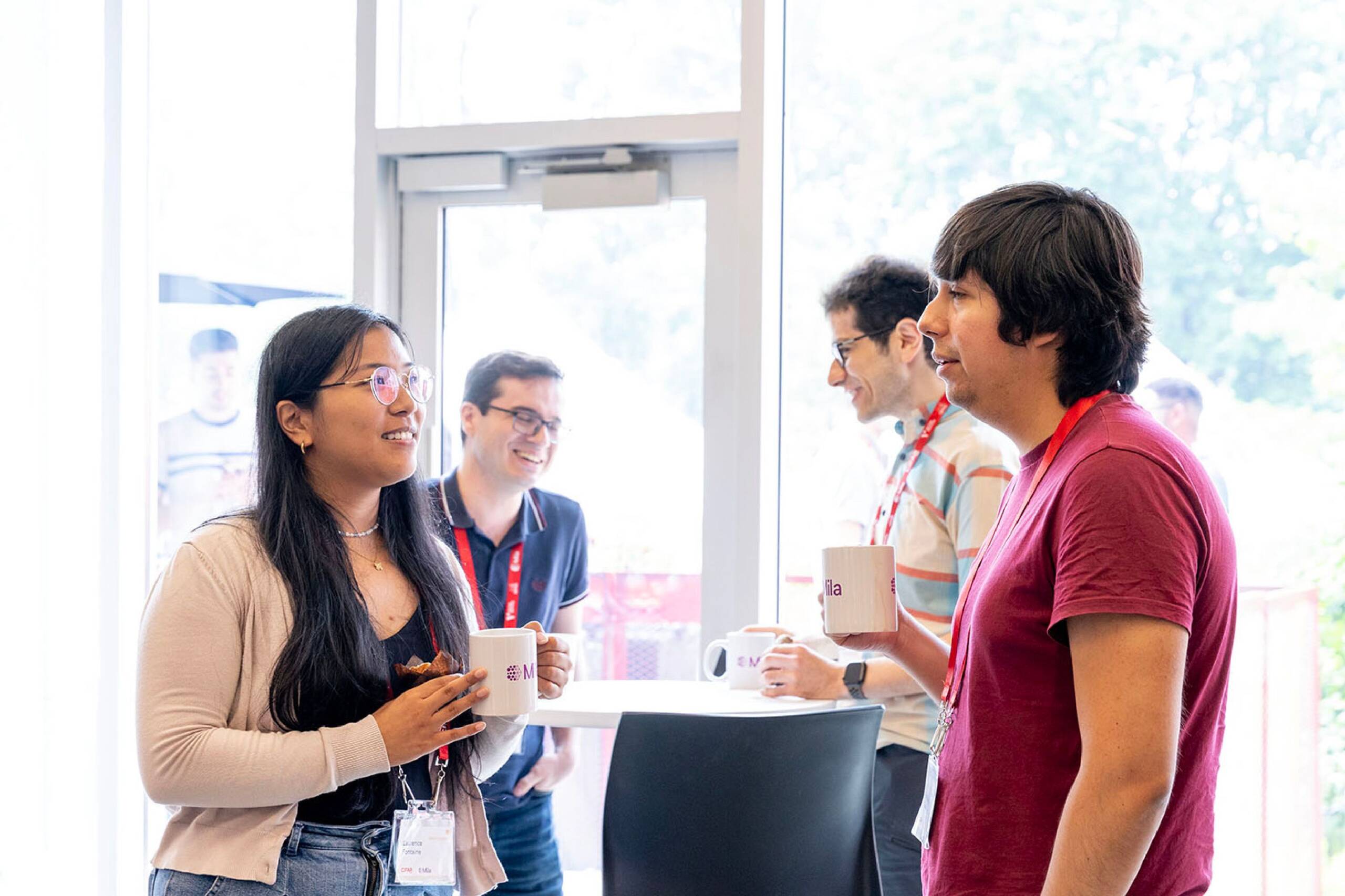
Transforming industry
AI is increasingly being recognized as a technological and strategic priority for most sectors.
Mila provides help for a full range of businesses, from AI startups to small and medium sized businesses looking to adopt AI to well established companies who need proofs of concept for the use of applied AI in solving complex problems.
Organizations that have signed agreements with Mila
The number of organizations that signed agreements with Mila during the reference period is 80, compared to 38 last year, for a staggering increase of 110%.
Companies
Since April 2022, 57 companies have benefited from technology transfer.
Internships
Mila students who completed industry internships in the past year.
Industry partners
In 2022–2023, the number of Mila industry partners jumped from 105 to 119, an increase of 13%.
Canadian partners
Of those 119 industry partners, 76 are Canadian.
Origin

- Quebec
- from the rest of Canada (Ontario and British Columbia)
- from abroad
Sectors

- 22% health
- 49% technology
- 2% environment
- 4% education
- 7% public sector
- 3% transport
- 4% finance
- 5% consulting
- 4% other
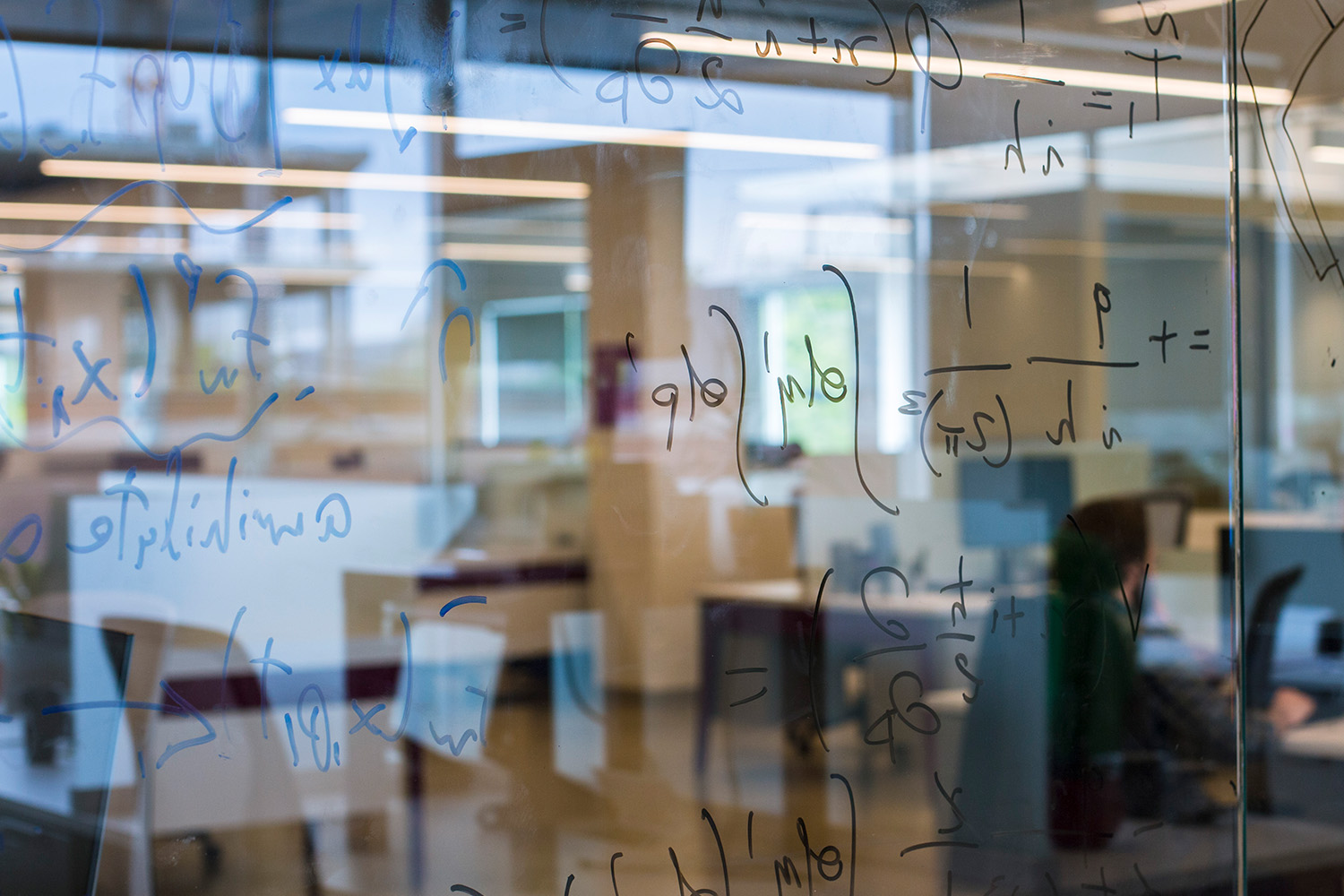
Helping SMEs start their AI adoption journey
There is often a significant gap between the SME's starting point in AI and the advance use of these technologies. Our AI Activation program equips SMEs with the necessary tools to bridge this gap.
Ground frost poses a significant risk to agricultural operations, leading to crop destruction when ground temperatures drop below 0°C. As part of a demonstration, Mila collaborated with Les Bleuetières 2000, a company specialized in blueberry production, to tackle this problem by developing a deep learning model. Using data from meteorological stations, satellite imagery and computer vision, the model predicts the risk of frost and displays it on a satellite image. Ultimately, this tool supports better field management and the adoption of precision farming strategies that can prevent frost.
Congruence Therapeutics has collaborated with Mila to tackle a vital drug discovery challenge. Their goal is to develop an advanced machine learning model for predicting atom-specific protein dynamics using static structures. Mila's team has successfully crafted a cutting-edge deep learning framework based on Graph Neural Networks (GNNs) over the past year. This framework can accurately forecast atomic B-factors from complex protein 3D structures. It's a versatile tool poised to accelerate the deployment of state-of-the-art AI architectures for dynamic protein property prediction, significantly advancing progress in this critical scientific domain.
Quebec-based startup Soralink develops sensors that allow industrial machine operators to collect a wide range of data in real time to carry out predictive maintenance on their equipment. Given the large number and varied types of data collected (sounds, vibrations, temperatures, etc.), it can be complex to understand which combination of factors constitutes an anomaly. Over the past year, the Mila team has tested a number of deep learning models, allowing the company to better understand the challenges associated with this complexity, and to identify possible avenues of improvement in order to better detect anomalies for their customers.
Applied Research: From lab to industry
Mila’s Applied Machine Learning Research Team works with organizations on challenging, high-impact machine learning projects. The team’s unique collaborative approach aims at designing and implementing cutting-edge solutions that benefit organizations by enriching their machine learning capabilities.

Dialogue, a leading virtual care provider offering customized support on a large scale, and Mila developed a proof-of-concept for a secure medical information collection system. This system, which is based on reinforcement learning and can be used as a support tool for doctors, performs collection more efficiently and accurately than an existing system. This work was published in 2022 at NeurIPS, one of the world’s leading machine learning conferences.
Maket (maket.ai) is a Quebec-based startup developing and deploying generative models to help architects and developers generate concepts and iterate faster while respecting the many constraints of the architectural industry. By combining Maket’s architectural expertise and Mila’s AI and research expertise, the two organizations were able to improve the generation criteria and explore approaches for generating higher-quality floor plans faster. This greatly improves the experience for Maket users and helps the company exploit its competitive advantage in a rapidly changing field.
Since early 2023, ChatGPT and other large language models (LLMs) have captivated the attention of most organizations. Many are wondering what impacts these new technologies can have on their activities and how to leverage these models without opening the door to new reputational risks. Mila has been on the forefront of discussions surrounding the responsible development of these technologies. Mila has also been invited to present directly to various organizations and at many conferences to demystify the use of these large models, reaching about 6,000 participants.
Mila Entrepreneurship Lab: Fostering the growth of AI startups
Every year, the Entrepreneurship Lab encourages Mila researchers to think like entrepreneurs and develop innovative ideas for AI applications. The Lab dedicates more than 100 hours to mentoring, workshops, and events aimed at fostering a strong sense of entrepreneurship among Mila’s student community. During its very first year, the Entrepreneurship Lab was a catalyst for the creation and growth of many promising startups. This year, the program moved into a brand new space that’s even more conducive to innovation, creativity and collaboration.
New entrepreneurial projects created by Mila researchers.
The number of startups that were awarded Mila Startup status by the Startups Committee, giving them access to funding, talent and various privileges through the Mila partnership program.
“Mila is a game changer for Montreal’s AI and startup ecosystem. I learned a ton about building real-world AI applications there and was able to connect with founders, researchers, investors and business people to help build the startup. I couldn't have done it without the support of Mila and the many professors and students there!”

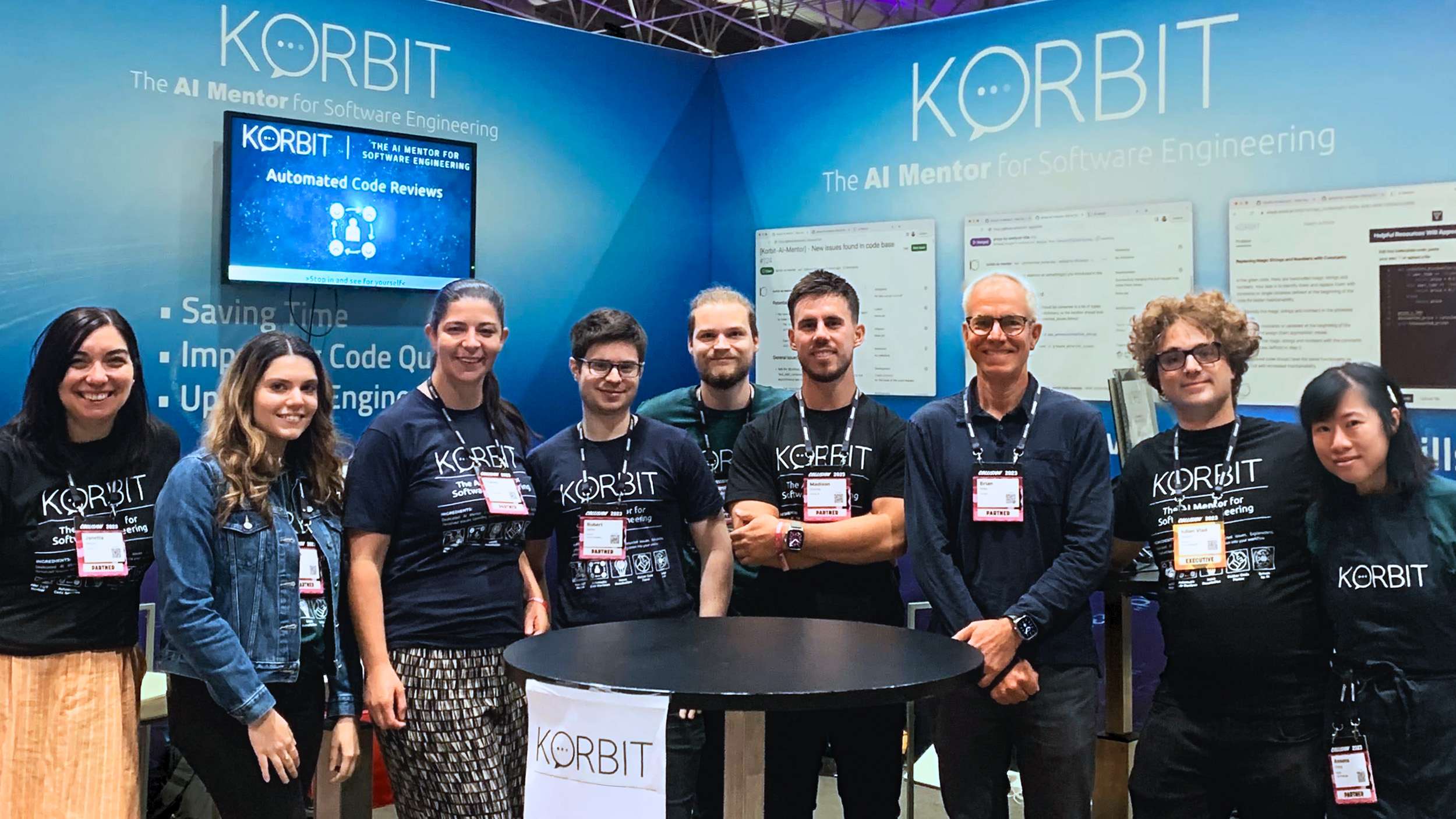
Korbit: The software engineering mentor
Korbit is a Mila startup that has developed a platform for analyzing lines of code in the same way an experienced engineer would, detecting and solving bugs and other issues. Cofounded by Iulian Serban in 2018, the company helps software engineering teams create optimized code in record time.
With the Korbit AI Mentor, users receive specific, constructive suggestions on how to improve their code, make it more readable, learn new librairies and align it with best practices. They’re also able to learn new tools and models for writing code.
In May 2023, Korbit raised 11.3 million dollars in Series A funding to further develop its AI platform and facilitate the introduction of the AI Mentor for software engineering.
10 new companies that obtained Mila Startup status in 2023:
Jumpcut AI
Jumpcut AI’s mission is to make video editing as efficient and intuitive as text editing.
Tiptree
Tiptree’s goal is to establish a comprehensive understanding of Earth data, providing scalable and versatile AI-based solutions for energy companies.
Tracel AI
Tracel AI is building a deep learning framework and ML ops platform for researchers and engineers. Written in Rust, the platform provides them with the most flexible, efficient and reliable tools to bring their ideas to life.
Gradients
Gradients is developing learning-based battery aging models for the electric vehicle (EV) industry. The aging models allow EV manufacturers to offer more accurate warranties and allow fleet owners to optimize their replacement schedules.
Driad AI
Driad AI is building new multimodal deep learning and remote sensing data analysis tools to redefine forest monitoring, forest inventories, and land restoration at all spatial scales. Its mission is to optimize forest use and management and promote sustainable forestry by providing comprehensive, granular information such as woodland volume, carbon sequestration and insect and disease detection in an efficient and accessible way.
SportBoost AI
SportBoost AI democratizes access to cutting-edge sports data through the power of computer vision, providing athletes and sports teams with a range of accessible tools to measure, analyze, and improve their performance.
Alpaca
Alpaca is a personalized AI toolkit designed to help artists explore further, iterate faster and amplify their creative potential.
Overmind
Overmind is a collaborative, AI-native data interface (like Jupyter) that operates in your browser. Overmind’s mission is to augment users’ analytical capabilities with an individualized data scientist, making computation accessible and intuitive for everyone.
Eureka
Eureka aims to harness our collective wisdom to design an AI tool for developing interactive AI application systems.
AwakeAI Inc.
AwakeAI Inc. is a Montreal-based health tech provider revolutionizing senior care management with a fully autonomous end-to-end machine learning solution.
Developing impactful partnerships
Reducing the negative impact of commercial buildings on climate change
BrainBox is working hard to reduce the carbon footprint associated with the energy used by its clients. Its collaborations with Mila are delivering results, particularly in reducing the negative impacts of commercial buildings on climate change. Since 2021, Mila and BrainBox AI have launched three different collaborations, including one that applies meta-learning to commercial building technology.
Conducting cutting-edge research with Vietnam's leading tech company
The collaboration between Mila and Vietnamese IT company FPT has yielded numerous results over the past year. Joint research projects conducted by the two organizations include System 2 with Professor Yoshua Bengio’s team, Massive Point Cloud with Professor Siamak Ravanbakhsh and AI4Code with Professor Jin Guo. All produced papers that were accepted at prestigious conferences: ICLR 2023 Workshop SNN, ACL 2023, NeurIPS 2023, EMNLP 2023. In addition to research, the partnership includes training and exchange programs that are highly beneficial to both organizations.
Building ties between two future-forward disciplines
AI and quantum science are two future-forward disciplines that have the potential to help solve some of the greatest social issues of our times. Mila developed a number of initiatives in partnership with Québec Quantique over the past year, including an event featuring professors Gilles Brassard and Yoshua Bengio that brought together industry, academic and public-sector stakeholders to discuss potential synergies between these two essential technologies. The number of Mila partners who are working at the intersection of AI and quantum science doubled in the past year.
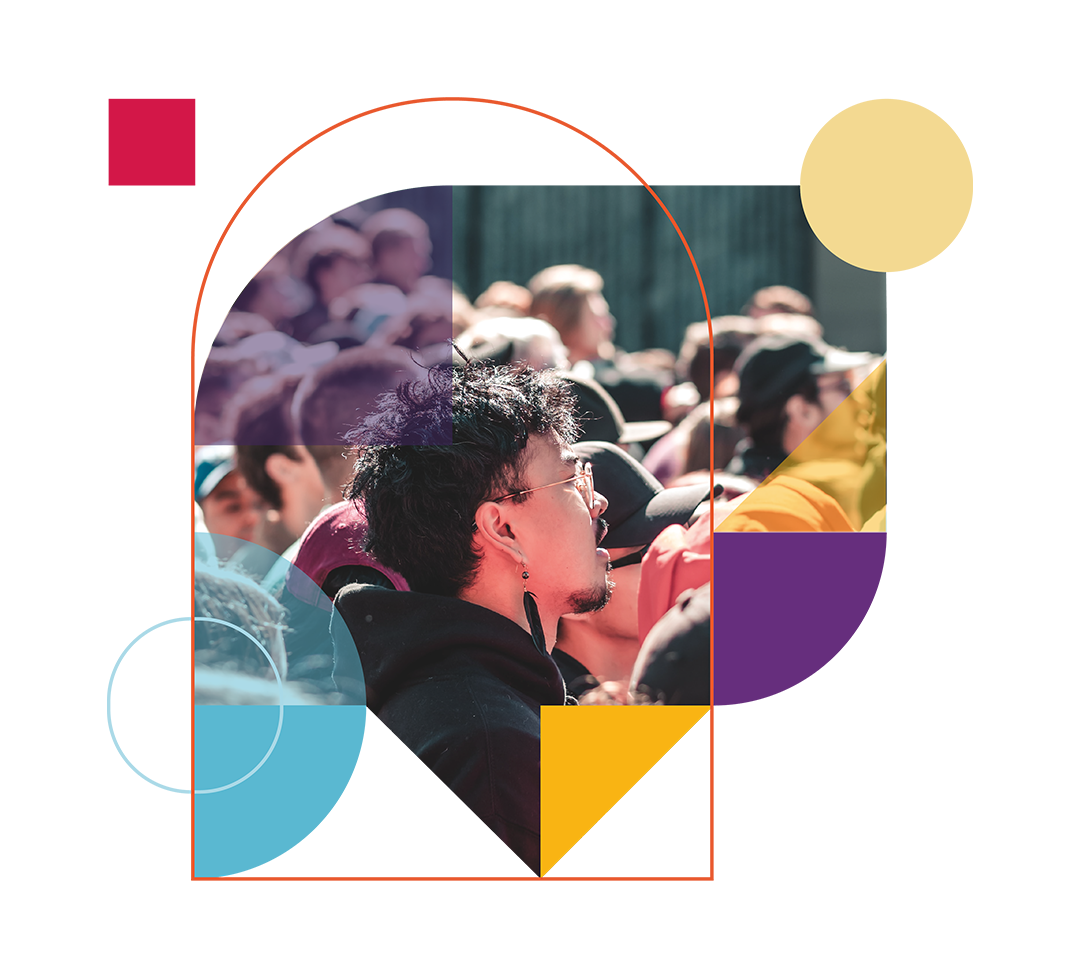
AI for humanity
The development of socially responsible AI for the benefit of all is at the heart of Mila’s mission. As a leader, Mila contributes to social dialogue and the development of applications that will benefit society through collaborations between researchers and stakeholders with diverse skills who wish to harness the potential of AI and advanced technologies to create a better world.
In 2023, Mila unveiled the Trustworthy and Responsible AI Learning Certificate (TRAIL) Industry program to provide industry members with the foundational knowledge, skills and tools to responsibly design and conduct their AI projects.
In 2023, Mila launched the AI Policy compass program designed to provide decision-makers and policymakers with a foundational understanding of AI technology, including an audit of current and emerging applications, its risks and transformative opportunities across fields.
In 2023, Mila hosted the first Summer School in Responsible AI and Human Rights, a joint initiative with the Université de Montréal to impart participants from various backgrounds and from all around the world with theoretical knowledge and practical skills to help them better understand and navigate important issues at the intersection of responsible AI and human rights.
Mila published two joint documents with the United Nations: in 2022, Mila and UN-Habitat co-published a white paper (AI and Cities: Risks, Applications and Governance) on the use of AI to support the development of people-centered sustainable cities and settlements and the potential challenges involved, and in 2023, Mila and UNESCO published a joint book (Missing Links in AI Governance) on the urgent need for a better governance of AI in the face of unprecedented technological change.
In 2023, Mila hosted the first edition of the AI4Good Lab since the program’s integration to the institute in January 2023. At the end of the seven week-long program, which aims to make AI education more inclusive, 80 participants from all across Canada presented machine learning prototypes they built over three weeks, applying knowledge gained from the program’s curriculum to explore how AI can be used to address societal challenges.
Public servants and policymakers need to better understand AI technology to know how best to regulate it and how to use it to better serve citizens. Mila professors and staff members introduce the most interesting and promising applications of AI to a public service audience while highlighting the associated risks. This will lead to a better public understanding of the benefits and the pitfalls of a rapidly evolving technology among public servants.
AI, climate and environment
Using ML to help accelerate the transition to lower-carbon energy sources
The FAENet: Frame averaging equivariant GNN for materials modeling project led by Mila Professors Yoshua Bengio and David Rolnick and Intel Labs researcher Santigo Miret aims to address the climate crisis by accelerating the transition to lower-carbon energy sources. Catalyst materials are vital for electrochemical reactions used in key industrial processes like renewable energy storage and electrofuel synthesis. This paper, presented at the International Conference on Machine Learning 2023 (ICML), proposes specific improvements for ML models, enhancing both efficiency and accuracy.

Facilitating the work of ecologists by mapping the distribution of bird species
Mila PhD student Mélisande Teng’s paper Bird Distribution Modelling using Remote Sensing and Citizen Science Data was recognized as the “overall best paper” at the ICLR 2023 Tackling Climate Change with Machine Learning Workshop in Kigali, Rwanda. The goal of the project is to facilitate the work of ecologists by leveraging easily accessible satellite images and citizen science data to map the distribution of bird species at scale and better understand species habitats.
Sharing knowledge at the intersection of AI and climate change
The first in-person edition of the Climate Change AI Summer School was held at Mila in August 2023 with the goal of educating and preparing participants with a background in AI and/or a climate change–related field to tackle major climate problems using AI.

AI and health
Mila positioned itself as a major contributor to the advancement of AI in the health and life sciences in 2022–2023, particularly through major partnerships aimed at creating an agile ecosystem and making AI an even more powerful tool for drug discovery and development.
Mila researchers Blake Richards and Guillaume Lajoie co-organized a workshop at Mila to explore the links between the brain and AI. Entitled “Tracing the Links between Cognition, Consciousness and AI,” it brought together multidisciplinary experts who were in the city for COSYNE, the world’s largest computational neuroscience conference, never before held in Montreal.
Mila has been a major partner in the creation of the Université de Montréal-based Eastern Canada Preparedness CBRF Hub, which brings together organizations from academia and industry, as well as government organizations and other nonprofits. The hub’s goal is to create an ecosystem enabling an agile and informed response from Canada to future pandemics and emerging health threats.
Mila and Amgen, one of the world’s leading biotechnology companies, announced the expansion of a partnership aimed at further transforming AI–guided drug development. As part of this evolution, Amgen is establishing a corporate laboratory at Mila’s headquarters where scientists from both organizations will be able to interact and collaborate.
Mila and Helmholtz Munich announced a collaboration to establish an international Helmholtz lab that will develop causal models of cell dynamics. The goal is to use Mila’s deep learning expertise and Helmholtz’s genomics-specific bioinformatics skills to model cellular dynamics from observations of single-cell genomics as well as the latent causes that govern these mechanisms.
This project aims to build an efficient and effective machine learning framework for searching molecules with designed properties and to showcase its applications on antibiotic and materials discovery, thereby enabling AI-empowered candidate discovery. This presents a solution for reducing a resource-intensive and time-consuming design bottleneck, which is a core design challenge across many industrial domains. Mila Core Academic Members Jian Tang, Yoshua Bengio and Doina Precup are directly involved in this project.
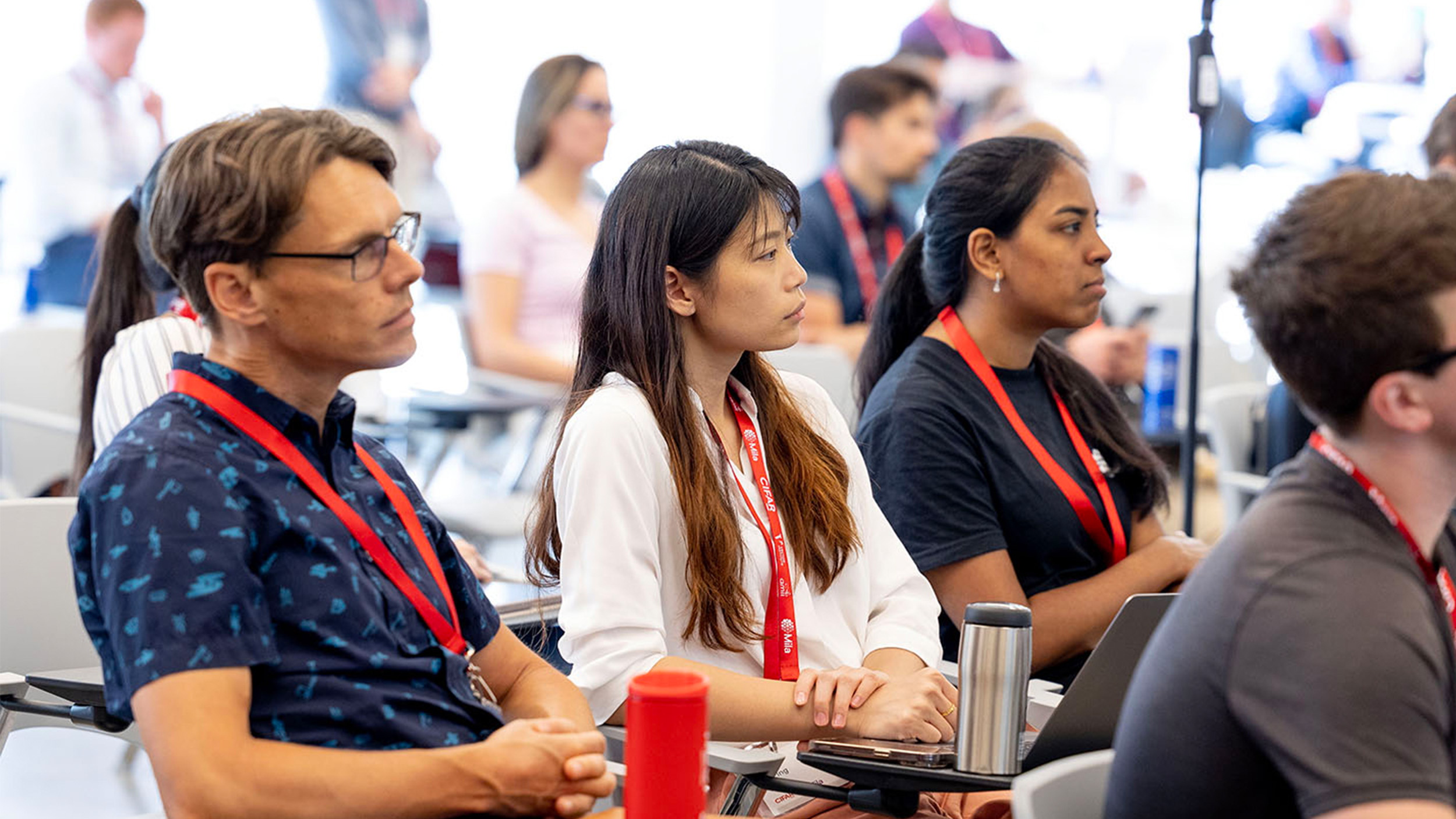
EDI by design. AI by all, for all.
Ever since it was founded, Mila has deployed initiatives to eliminate the systemic barriers faced by groups underrepresented in AI. Those values and that leadership have resulted in policies, programs and organizational structures such as the equity, diversity and inclusion (EDI) policy, the EDI committee, EDI training and a Mila ombudsman, all of which reflect the principles of Mila’s EDI framework. Based on three strategic pillars, the framework is designed to maximize the positive impact of Mila’s EDI initiatives.
Talent
In one year, the proportion of women among professor-researchers increased by 13, reaching a total of 33 women out of 124, which translate to a female presence of 27% in 2022-2023. The number of people from underrepresented groups has also gone up by 8% in the past year.
Women@Mila is a grassroots initiative led by student and staff volunteers focused on enriching the social, academic and professional experiences for all women working and studying at Mila through community-building events and initiatives.
Mila launched its EDI Scholarship Program last December and was able to award scholarships to 15 members of the community in the first category, Women in AI, as well as six scholarships to researchers in the second category, EDI in Research.
Culture
For the latest installation of Mila’s mentorship program, half of the spaces were set aside for underrepresented groups. Mila’s mentorship program was created to provide Mila researchers with a working environment that fosters their growth and helps them achieve their full potential.
A series of EDI training sessions were held, including a session on unconscious bias for Mila’s leaders, an EDI training session for mentorship program participants, an EDI training session for Mila’s student recruitment committee, and two other sessions that were made available to the wider academic community: on EDI in research and EDI in grant proposals.
Knowledge
Mila is also dedicated to supporting projects that integrate EDI, such as Biasly, an AI tool that detects misogynistic comments, and First Languages AI Reality (FLAIR), an AI tool to help Indigenous languages flourish.
Cybersecurity
The need for vigilance in the face of rapidly evolving cybersecurity threats has led Mila to enhance its approach to information security. Several major projects will be initiated over the next three years, while others are already operational. A multidisciplinary team was created to coordinate and implement the initiatives.
Alongside its current initiatives, Mila launched its first of four yearly awareness campaign in spring 2023. The first campaign provided an introduction to cybersecurity and achieved 100% participation among employees. The second campaign, which is on protecting information, is currently underway. All of the information provided in the awareness campaign aims to ensure that Mila meets industry standards and is better prepared to manage cyberrisks.
In terms of governance, a cybersecurity committee was created to pursue Mila’s cybersecurity goals. Mila drafted and approved a number of cybersecurity-related directives, including one on supplier security management, and defined a set of management indicators that will be operational in the coming months.
Mila is also pursuing discussions with its affiliated universities in order to align on common goals and define the roles and responsibilities of each. Their proactive collaboration helps build synergy between the information security policies and procedures of all involved.
Finance
Revenues
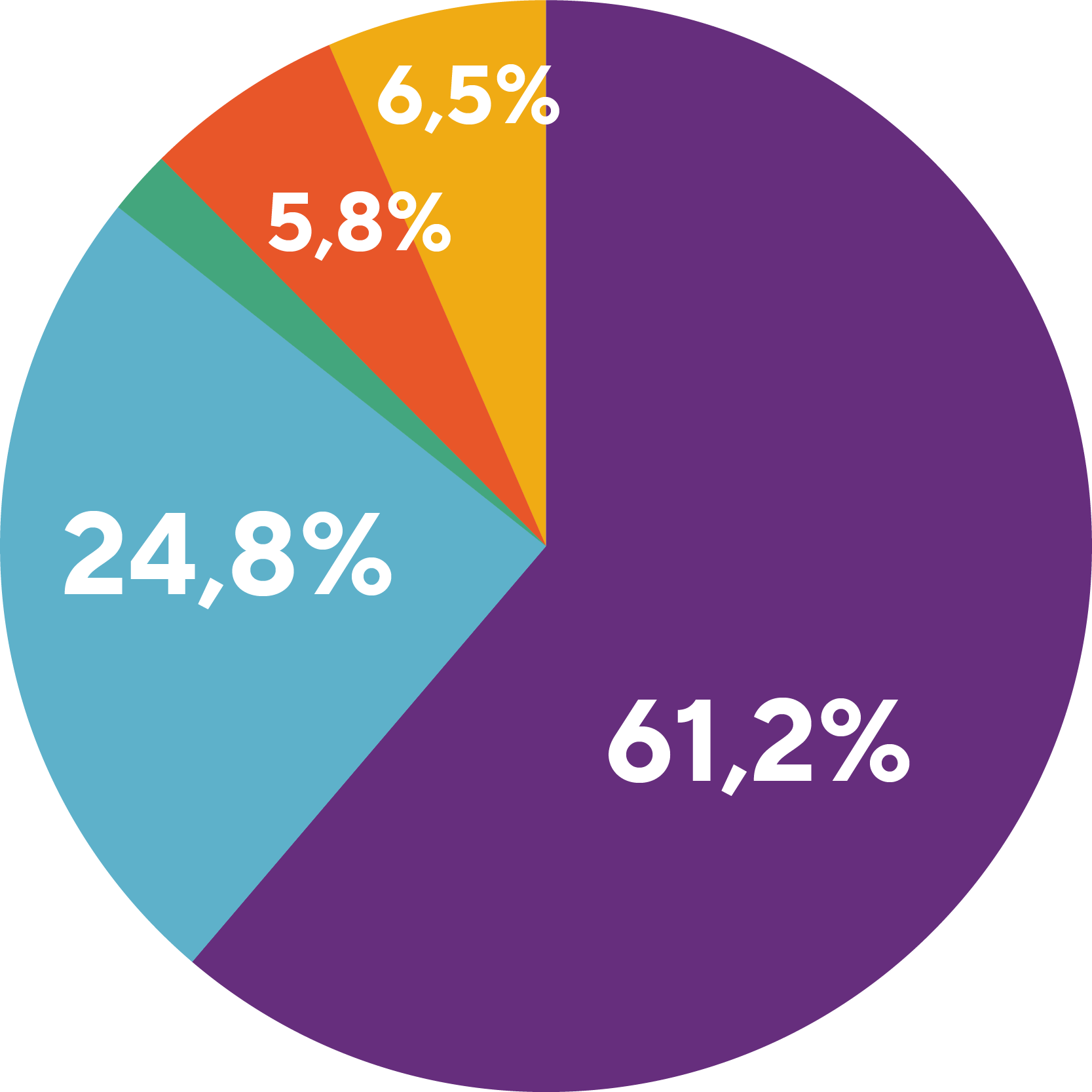
- Government grants
- Industry contracts
- Amortization of deferred contributions related to tangible capital assets
- Leasing
- Other
Total revenue
42 636 432Expenses

- Research
- Research support, innovation and computing power
- Projects, industry relationships and training
- General administration
- Amortization of tangible capital assets
Total expenses
39 591 411Mission and values
Our mission
Mila’s mission is to be a global pole for scientific advances that inspires innovation and the progress of AI for the benefit of all.
Our values
Mila’s values are the cornerstone of our vision and the DNA of our organization:
- Scientific rigour and excellence
- Sharing and open science
- Diversity, equity and inclusion
- Ethics and social conscience
- Democracy and collegiality
- Collaboration and transparency
- Academic freedom

Our strategic pillars
AI talent
Attract, train and retain a diversified pool recognized globally for their high-level expertise.
Cutting-edge research
Achieve the highest levels of scientific leadership in the development of AI.
AI adoption
Contribute to partnerships, projects and initiatives to accelerate the deployment and adoption of AI.
Social influence
Develop perspectives on the potential of AI and the issues related to its use.




